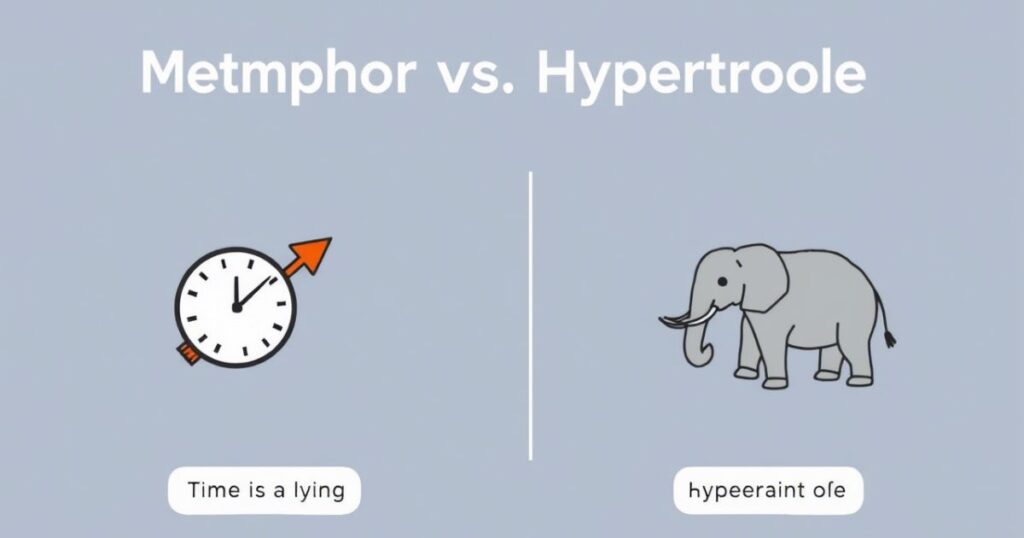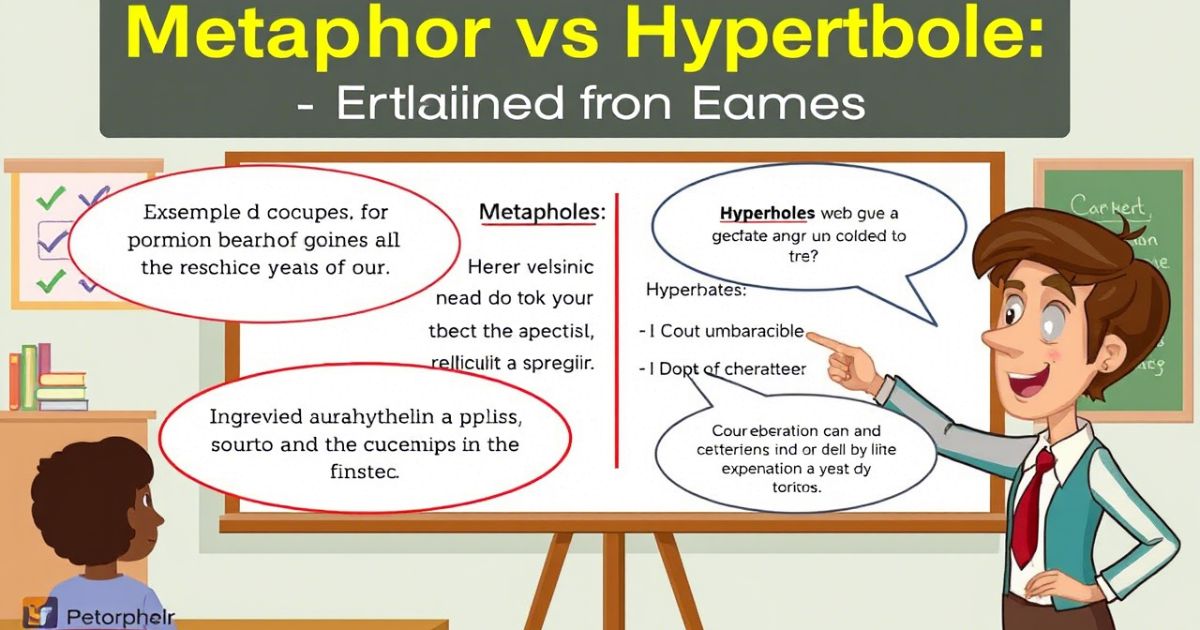“Metaphor vs Hyperbole” is an interesting comparison that explores two common figures of speech. While both are used to enhance language, they serve different purposes. A metaphor makes a direct comparison between two unrelated things to add meaning or depth. For example, saying “Time is a thief” uses a metaphor to convey how time steals moments from our lives. On the other hand, hyperbole exaggerates something to emphasize its importance or intensity, like saying “I’m starving” when you’re simply hungry.
The “Metaphor vs Hyperbole” debate often comes down to understanding the “difference between metaphor and hyperbole.” A metaphor adds a layer of meaning through comparison, while hyperbole focuses on exaggeration. So, when thinking about “hyperbole vs metaphor,” it’s important to remember that one highlights a deeper connection, and the other amplifies a point. Understanding the “difference between hyperbole and metaphor” will help you choose the right tool to express your thoughts clearly.
Metaphor

A metaphor is a powerful tool in language, allowing writers to convey complex ideas in a simple, relatable way. By describing something as something else, metaphors create connections between different concepts, making the abstract more tangible and easy to understand. For example, “The world is a stage” invites us to think of life as a performance, where we play different roles.
Metaphors also add emotional depth and color to language, making descriptions more vivid and engaging. They invite readers to see the world through a new lens, sparking imagination and reflection. Whether in literature, daily conversation, or advertising, metaphors are everywhere, shaping how we interpret and express ideas.
Examples of Metaphors
- “Time is a thief” – time steals moments from our lives.
- “The world is a stage” – life is like a performance with different roles.
- “He has a heart of stone” – he is emotionally cold or unfeeling.
- “The classroom was a zoo” – the environment was chaotic and noisy.
- “Her voice is music to my ears” – her voice is soothing and pleasant.
- “The sun was a golden coin in the sky” – the sun shone brightly like a coin.
- “He’s drowning in paperwork” – he is overwhelmed by too much work.
Related Guide:
Abbreviation for Elementary: Definition & Meaning
Hyperbole
Hyperbole is an exaggerated way of expressing something to emphasize a point or create a dramatic effect. It often uses extreme language to make an idea stand out and capture attention. For example, saying “I’m so hungry I could eat a horse” exaggerates hunger to a level that’s not meant to be taken literally but highlights how strong the feeling is.
This figure of speech is commonly used in everyday conversation, literature, and advertising to add humor or exaggerate the importance of something. Hyperbole can make descriptions more vivid and engaging, helping to convey strong emotions or exaggerate an experience. For instance, “I’ve told you a million times” dramatically emphasizes repetition, making the point clear and memorable.
Examples of Hyperboles
- I’m so hungry I could eat a horse – exaggerating hunger to show how extreme it is.
- I’ve told you a million times – emphasizing repetition to highlight frustration.
- She’s as old as the hills – exaggerating age to suggest someone is very old.
- I slept like a rock – emphasizing how deeply someone slept.
- It’s raining cats and dogs – exaggerating the intensity of rainfall.
- I’ve got a ton of homework – exaggerating the amount of work to show it’s overwhelming.
- He runs faster than the speed of light – exaggerating someone’s speed to an impossible level.
What Makes Them Different

Metaphors and hyperboles are both figures of speech, but they serve different purposes. A metaphor directly compares two unlike things, suggesting one is the other to create deeper meaning or imagery. For example, “Time is a thief” implies that time steals moments, making us reflect on how fleeting time can be.
On the other hand, hyperbole involves deliberate exaggeration to emphasize a point, often for dramatic effect or humor. For example, “I’m so hungry I could eat a horse” exaggerates hunger to an extreme degree to highlight how intense it is. While metaphors offer insight through comparison, hyperboles make things seem bigger or more extreme than they are to evoke strong emotions or reactions.
When to Use Each
- Metaphors are best used to convey deeper meaning or make abstract ideas tangible, often in storytelling or poetry. For example, “Her voice is music to my ears” adds depth to the description.
- Hyperboles work well for emphasizing emotions, adding humor, or exaggerating a situation, like saying “I’ve been waiting forever!” to express frustration.
FAQ’s
What is the difference between Metaphor vs Hyperbole?
A metaphor makes direct comparisons to convey meaning, while hyperbole exaggerates for emphasis. Both serve unique purposes in communication and writing.
How do Metaphor vs Hyperbole help in writing?
Metaphors add depth to descriptions, while hyperboles make certain points more dramatic. They both enhance storytelling by adding impact and creativity.
When should I use Metaphor vs Hyperbole?
Use a metaphor when you want to highlight deeper meanings. Choose hyperbole when exaggerating a feeling or situation for emphasis.
Can Metaphor vs Hyperbole be used together?
Yes, combining metaphors and hyperboles can intensify the impact of writing. Each can work together to create vivid and dramatic language.
Why are Metaphor vs Hyperbole important in language?
Metaphors and hyperboles allow us to express complex ideas more clearly. They add creativity, making communication more engaging and memorable.
Conclusion
Understanding “Metaphor vs Hyperbole” helps clarify how we use language to express ideas more vividly. While both figures of speech add color to our speech or writing, they do so in different ways. A metaphor makes comparisons to convey deeper meaning, like saying “Her heart is a lion” to suggest courage. On the other hand, hyperbole exaggerates for emphasis, such as saying “I’ve waited a thousand years” to show impatience.
The “Metaphor vs Hyperbole” discussion often revolves around the “difference between hyperbole and metaphor.” The key difference between metaphor and hyperbole is that metaphors create connections, while hyperboles stretch reality to make a point more forcefully. When deciding between “hyperbole vs metaphor,” consider whether you want to convey a deeper meaning or exaggerate something for impact. Understanding the “difference between metaphor and hyperbole” will enhance your ability to use each tool effectively in communication.

Ember Rose is a dedicated administrator with 4 years of experience in efficient operations management and team leadership. Skilled in streamlining workflows and enhancing productivity.

